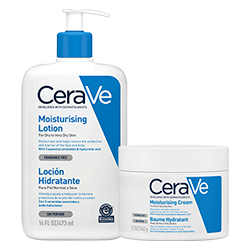What is sensitive skin?
Sensitive skin is characterized by an increased tendency to react to environmental factors,4 and it could be related to genetic factors4 or due to a variety of skin conditions. If you have sensitive skin, your symptoms can also be triggered by contact with specific products or ingredients.2 A common underlying factor in sensitive skin can be a weakened skin barrier. Ceramides are an important component of your skin’s epidermal barrier, and although they are produced naturally by the skin, their levels can be depleted by a variety of internal and external factors.5
How to know if you have sensitive skin
Common signs of sensitive skin could be skin redness, itching, burning and stinging—especially when you recently in contact with new substance or products2 Other sensitive skin symptoms include frequent rashes, itching, dry patches, facial redness, reactions to extreme weather conditions and more.2 Skin sensitivity could vary among individuals, if you experience skin irritation and are unable to identify the source, it’s best to schedule an appointment with your dermatologist.
What causes sensitive skin reactions?
Sensitive skin on the face and body can react to a wide array of irritants. A skin reaction to detergent is one of the common causes, which is why it’s best to use laundry products that are free of fragrances and dyes. Other frequent causes of sensitive skin reactions include harsh soaps, household cleaners, rough fabrics (such as wool), heat, latex and more. Certain ingredients found in skincare and makeup products can cause reactions as well.6
REFERENCES
1. Berardesca, E., Farage, M. and Maibach, H. (2013), Sensitive skin: an overview. Int J Cosmet Sci, 35: 2-8.
2. Baumann, L. (2009) Cosmetic Dermatology: Principles and Practice (pp.94-97). New York: McGraw-Hill Medical
3. https://www.ncbi.nlm.nih.gov/pmc/articles/PMC3519246
4. https://www.webmd.com/beauty/sensitive-skin-20-questions
5. https://www.researchgate.net/publication/10929073_Ceramides_and_Skin_Function
6. https://www.webmd.com/skin-problems-and-treatments/features/dirty-dozen




